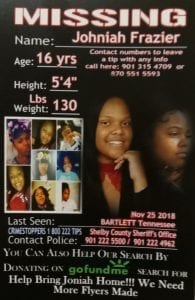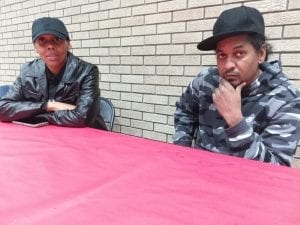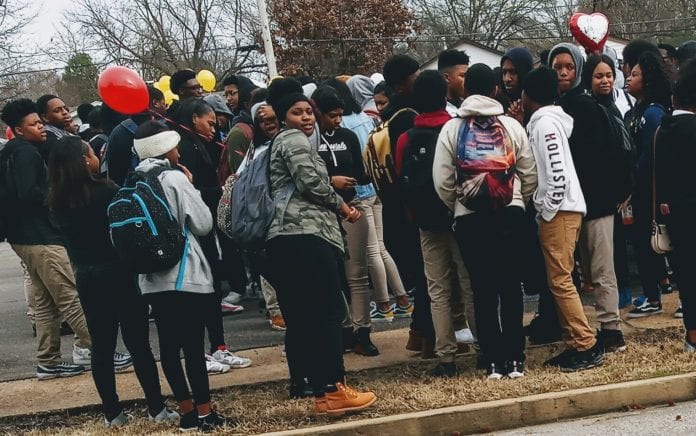
The entire student body at Memphis Academy of Health Sciences hosted a program on Thursday afternoon for a missing student who no one has seen or heard from since last year.
“Hearts for Johniah: An Ongoing Celebration of Love” brought back front and center Johniah Frazier, the 16-year-old teen who went missing on November 25, 2018.
“Every night for the past few months, I’ve been out in the streets until three and four in the morning, looking for Johniah,” said Shemickco Frazier, the missing teen’s mother told students. “You can’t trust everybody. Your friends are the ones who will put you into a trick bag.
“Predators want y’all. Keep your eyes open, and stop trusting everybody. They want y’all because they can manipulate you. But I’m standing 10 toes down, and I’m fighting for mine. Johniah is alive, and I’m going to get her back. I’m not going to stop until I get her back.”
Featured keynote speaker, Minister Christopher Broom of Morningview Baptist Church, encouraged student to love themselves and “decide that you matter before its too late.”
No one believes that Johniah Frazier is dead, and they don’t believe she ran away. Her parents believe that she connected with someone — some adult, some older person — and that she may have gone out to meet them.
“You all have four or five Instagram accounts. You’re hiding things from your parents, but there are people who are after you, girls and boys,” said Broom. “I’m going to give you four ways that you can express love to yourself:
1) Watch what you put on the Internet; 2) Watch who supports and follows you. If an adult tries to contact you, let your teachers know. Tell your parents.; 3) Watch the pictures you post online, and 4) Watch what’s happening in your community. Take someone with you when you’re walking somewhere. And make sure at least three other people know where you’re going. And go where you said you would be.”
Dean of Students Trenton Watson told students that, like Johniah’s parents, he was still looking for her.
“I have friends in Atlanta and Nashville and other places. I’ve made sure they have her flyers, and I’ve told them to please be on the lookout for her, Watson said.
“When we release these balloons, we are touching and agreeing that she is well. It is symbolic of how we feel about one of our own, how we feel about one of our family. Our school motto is: ‘We will never settle,’ and we will never settle until Johniah comes back to us.”
After the balloon release, Johniah’s mother and father had more to say about their missing daughter.
 “Obviously, we want Johniah back home, but we’ve also got to get these laws changed,” said her mother. “If a child is between the ages of 14-18, they have a right to leave home, and they can have consensual sex. Most people don’t know that.”
“Obviously, we want Johniah back home, but we’ve also got to get these laws changed,” said her mother. “If a child is between the ages of 14-18, they have a right to leave home, and they can have consensual sex. Most people don’t know that.”
Asked about police involvement, Johniah’s father, John Frazier, said, “Don’t let me get started on that.”
“Teenagers run away, and kids in that age group — there aren’t a lot of resources they’re going to use on them. It’s just like my wife said, if they are 14-18, they have a right to walk away from home. They can leave home if they want to.”
Although its been nearly three months without any word from Johniah, her parents believe she is still alive.
“A mother knows, has a feeling, when her child is deceased. Johniah is not dead,” said Shemickco Frazier. “She is somewhere. Someone has her, and she doesn’t have access to outside communication.
Or, it could be that her mind is being manipulated through drugs or something, that she doesn’t know to contact us or call home. She loved the sciences, and she loved animals. Johniah had dreams. We won’t stop until she is back with us.”
Johniah went missing four days after her 16th birthday. Her parents feel that if she is not home by November 21st, on her 17th birthday, even fewer resources will be committed to finding her by police.
A message was left for Memphis Police detectives, but no return call had been received by press time.

Johniah’s parents feel that this is a case of
“missing white women’s syndrome.”
Missing white women’s syndrome is a term coined by social scientists studying racial disparity in murdered and missing persons.
According to the Journalism Center on Children and Families, “Sociologists define the phenomenon as an undue focus on young, white women who disappear, with the disproportionate degree of media coverage they receive being compared to cases concerning missing women of other ethnicities, socioeconomic classes, or with missing males.”




